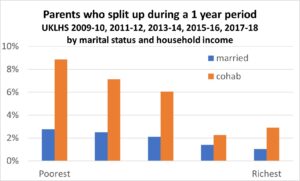
KEY FINDINGS
- Nearly nine in 10 parents still together with children aged 13-15 are married
- Cohabiting parents three times more likely to break-up
- Stability gap between marriage and cohabitation present in all five income groups
Poor married couples with children are more stable and likely to stick together than rich unmarried couples with children, according to a major new study from the Marriage Foundation.
The study, Married Poor More Stable that Unmarried Rich – Why marriage is still the best way to find reliable love analyses data from the UK Longitudinal Household Survey, (Understanding Society), grouping parents into the five socio-economic groups and comparing the relative stability between married and unmarried couples in each category over five alternate one year periods, from 2009 to 2010, from 2011 to 2012, from 2013 to 2014, from 2015 to 2016, and from 2017 to 2018. It found that cohabiting parents were 3.4 times more likely to split up compared to married parents (6.5 per cent versus 1.9 per cent) and that this “gap in stability runs across all five income quintiles”.
“The evidence is that this stability gap has remained pretty constant throughout the ten year period of this study. Even after taking into account mothers age, education, ethnicity, household income and relationship happiness, the odds of cohabiting parents splitting up are consistently twice as high as those of married parents” it says.
“The consequence of high levels of breakup among cohabiting parents is that few parents remain as unmarried cohabiting couples as their children grow older. Most split up or marry. Our analysis shows that 86 per cent of all intact couples with 13-15 year old children are married.”
The report which is being released on the eve of the think-tanks 10th Anniversary says: “Amongst the very richest parents, 2.9 per cent split up if cohabiting versus 1 per cent if married. Amongst the very poorest, 8.9 per cent split up if cohabiting versus 2.8 per cent if married. Remarkably, the very poorest married couples are slightly more likely to remain together than the very richest cohabiting parents. The only cohabitees who do better are the second richest group who split at a rate of 2.3 per cent.”
Harry Benson, Marriage Foundation’s Research Director commented: “These figures demonstrate, yet again that marriage remains the most stable form of relationship especially for raising children and is more important than income on couples sticking together. Even once we controlled for mothers age, education, ethnicity, relationship happiness and income, the odds of cohabiting parents splitting up are consistently twice as high as married parents. This explains why our analysis shows that nearly nine in ten of all intact couples with 13-15 year children are married.”
